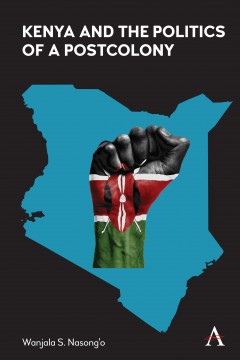Kenya and the Politics of a Postcolony
By Wanjala S. Nasong’o
Other Formats Available:
E-Book- About This Book
- Reviews
- Author Information
- Series
- Table of Contents
- Links
- Podcasts
About This Book
This book sets out to probe, explore and evaluate the betrayal of anticolonial nationalism in Kenya. Contemporary Kenya’s emergence is rooted in the colonial enterprise, its deleterious effects and the subsequent decolonization spearheaded by a fierce anti-colonial nationalism that was embodied in freedom struggles at the cultural, political, and military levels. As a settler colony, the colonial settlers hived off millions of hectares of the best land in the highland areas of Kenya and appropriated them for themselves thereby generating a large mass of the landless. This land alienation constituted one of the most deeply felt grievances which, together with the exclusivist, exploitative and oppressive colonial system, inflamed anti-colonial nationalism that undergirded the struggle for independence. The expectation on the part of the masses was that independence would bring about social justice, restitution of the stolen lands, and a government based on the will and aspirations of the governed. Political developments soon after independence, however, demonstrated the extent of betrayal of the cause of anti-colonial nationalism, which has remained the reality to date. This book covers the extent of this sense of betrayal from the time of independence to the present. It begins by locating contemporary Kenya within the colonial context then proceeds to thematic issues of betrayal including the fall out between President Kenyatta and Vice President Odinga over ideology and issues of development, which constituted the first betrayal; the scourge of bureaucratic corruption and rent seeking; the question of land and associated historical injustices; and electoral malpractice since the return of multiparty politics in 1992 to the most recent elections of 2022. The implications of these dynamics for the future of the Kenyan polity are delineated and discussed.
Reviews
“Kenya and the Politics of a Postcolony is the most comprehensive study of the politics of independent Kenya from its colonial origins to the present. Nasong’o’s approach is uniquely profound, the analysis is critically rigorous, and the results are insightfully illuminating. The breadth and depth of this volume guarantee it an enduring shelf life, and the final result is a volume whose quality is beyond reproach.” — Steven J Salm, Endowed Professor of History, Xavier University of Louisiana
“Professor Wanjala S. Nasong’o has written a compelling and insightful book. Filled with illuminating historical insights, it accomplishes a rare task, which is to boldly offer a critical review of the ruling elite’s failure to build a viable nation by, of, and for the people of Kenya from independence to the present and beyond.” — Eric E. Otenyo, PhD, Professor & Diversity Fellow, Northern Arizona University
“A masterful history of Kenyan politics, this book provides a critical narrative of key developments in modern Kenyan politics, spanning the colonial and postcolonial periods. Colonialism lays the foundation for contextualizing the roles of African agency, international diplomacy, and Chinese investments in shaping Kenya’s political landscape against the background of political betrayal, mainstream politics, corruption, the land question, and the national debt problem. It is a must-read for students and scholars of African and international studies.” — Martin S. Shanguhyia, Associate Professor of African History, Syracuse University, New York
“This groundbreaking seminal work, Kenya and the Politics of a Postcolony by Wanjala S.Nasong’o, is timely and will generate debate in an area which has largely been under-researched and overlooked by African scholars and Africanists. Comprehensively addressing, from conceptual and theoretical corpus, the interface between politics and post colony in Kenya makes the book exceptional.” —Korwa Gombe Adar, Professor of International Studies, United States International University-Africa, Nairobi, Kenya
“It is an in-depth, well-researched, and well-written book. It is a must-read for scholars in the fields of African Studies, International Studies, and all those seeking to explore possibilities of redefining and reshaping the destiny of Kenya, the African continent, and the larger global south post coloniality in all spheres.” —Peter Otiato Ojiambo, Associate Professor and Director, Graduate Studies, University of Kansas, USA
“This book delves deeper into the general sense of betrayal held by the Kenyans, as many other Africans in other parts of the continent felt about their nationalist leaders from whom much was expected at the end of colonial rule. Covering the failures of the succeeding generations of Kenya’s postcolonial leaders after the founding fathers’ departure to the present is critical.” —Raphael Njoku, Idaho State University, Pocatello, USA
Author Information
Wanjala S. Nasong’o is Professor of International Studies at Rhodes College in Memphis, Tennessee, USA, where he teaches courses in comparative politics and international relations. He is also a Carnegie African Diaspora Fellow.
Series
Anthem Advances in African Cultural Studies
Table of Contents
List of Figures and Tables; Abbreviations; Acknowledgements; Introduction; 1. A Pernicious Global Enterprise: The Roots of Colonialism; 2. The Making of Contemporary Kenya: The Colonial Context; 3. Independence and the First Betrayal: Kenyatta vs. Odinga; 4.Abetting Authoritarianism: The Role of the United States; 5. Inklings of True Nationalism: Chelagat Mutai and the ‘Bearded Sisters’; 6. National Betrayal: Bureaucratic Corruption and Rent Seeking; 7. Broken Promises: Historical Injustices and the Land Question; 8. Not Yet Democracy: Electoral Shenanigans and Democratic Reversal; 9. Mortgaged to China: A New Colonialism?;10. Conclusion: Future Prospects; Bibliography; Index.
Links
Stay Updated
Information
Latest Tweets



